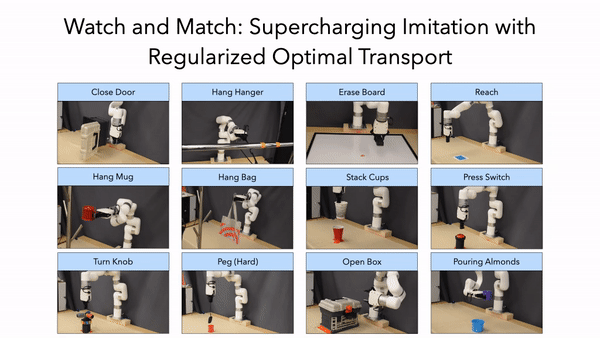Publications
Publications by categories in reversed chronological order.
2022
-
 Watch and Match: Supercharging Imitation with Regularized Optimal TransportSiddhant Haldar, Vaibhav Mathur, Pinto Yarats, and 1 more authorConference on Robot Learning (CoRL) (accepted) 2022
Watch and Match: Supercharging Imitation with Regularized Optimal TransportSiddhant Haldar, Vaibhav Mathur, Pinto Yarats, and 1 more authorConference on Robot Learning (CoRL) (accepted) 2022Imitation learning holds tremendous promise in learning policies efficiently for complex decision making problems. Current state-of-the-art algorithms often use inverse reinforcement learning (IRL), where given a set of expert demonstrations, an agent alternatively infers a reward function and the associated optimal policy. However, such IRL approaches often require substantial online interactions for complex control problems. In this work, we present Regularized Optimal Transport (ROT), a new imitation learning algorithm that builds on recent advances in optimal transport based trajectory-matching. Our key technical insight is that adaptively combining trajectory-matching rewards with behavior cloning can significantly accelerate imitation even with only a few demonstrations. Our experiments on 20 visual control tasks across the DeepMind Control Suite, the OpenAI Robotics Suite, and the Meta-World Benchmark demonstrate an average of 7.8× faster imitation to reach 90% of expert performance compared to prior state-of-the-art methods. On real-world robotic manipulation, with just one demonstration and an hour of online training, ROT achieves an average success rate of 90.1% across 14 tasks.
2017
-
 Assessing the Effects of Social Familiarity and Stance Similarity in Interaction DynamicsKuntal Dey, Ritvik Shrivastava, Saroj Kaushik, and 1 more authorCOMPLEX NETWORKS 2017
Assessing the Effects of Social Familiarity and Stance Similarity in Interaction DynamicsKuntal Dey, Ritvik Shrivastava, Saroj Kaushik, and 1 more authorCOMPLEX NETWORKS 2017Homophily, the phenomenon of similar people getting connected to and being socially familiar with each other, is well-known on online social networks. Detection of user stance towards given topics, on online social networks, specifically Twitter, has emerged as a mainstream research topic. The current work provides insights into the impact of topic-specific stance similarity and social familiarity on social interaction dynamics. This is a novel and yet fundamental problem in social networks research, that has so far remained unexplored in the literature. Specifically, we address two key aspects. One, we investigate whether the smoothness (politeness) level of conversations between user pairs, relate with overall stance similarity (spanning across topics). Two, we examine the impact on interaction smoothness (politeness) with respect to social familiarity and topical stance-similarity. We propose a novel approach based on word embedding, to compare across users and across topics. We analyze the relationship between topical stance similarity, social familiarity and interaction politeness of users, with respect to specific familiarities between user pairs as well as social communities.